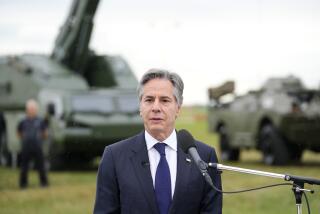Bush Lifts Economic Sanctions on S. Africa : Apartheid: He sees ‘irreversible’ progress by Pretoria. Opponents in Congress plan no effort to undo the move.
WASHINGTON — President Bush, declaring that South Africa is making “irreversible” progress toward racial equality, lifted U.S. economic sanctions against the white-ruled nation Wednesday despite strong objections from its best-known black leader and many American liberals.
The action, which had been anticipated for months, is of less economic importance than symbolic, as a mark of international acceptance of the once-outcast regime.
Although U.S. firms are now free to return to South Africa, Bush Administration officials and nongovernment experts said they do not anticipate an immediate upsurge in business activity. During the five years that sanctions were in place, U.S. investment in South Africa fell to $750 million from $2.3 billion.
“Political and economic pressure had been brought against the government of South Africa by the United States and by other nations for the last several years, and progress has been slow and often painful,” Bush told a White House press conference. “But progress has definitely been made. . . . I firmly believe that this progress is irreversible.”
Bush acted against the advice of Nelson Mandela, president of the African National Congress, who said that it is too early to remove the sanctions. The President said he telephoned Mandela to tell him that “lifting the sanctions at this time is the right thing to do in order to encourage continued change” in South Africa.
Herman Cohen, the State Department’s top Africa expert, later told reporters that Mandela told Bush “that it was premature in the sense that the process of dismantling apartheid hadn’t proceeded as far as it should have.”
On Capitol Hill, many of the original supporters of the sanctions legislation--passed in 1986 over the veto of then-President Ronald Reagan--also objected to Bush’s decision. But they conceded that they lack the political muscle to reimpose the sanctions.
California Rep. Ronald V. Dellums (D-Berkeley) said that the current “political atmosphere” precludes the passage of new sanctions legislation. He said he does not favor trying to overturn the President’s action in court.
Nevertheless, Dellums said, “I’m not surprised by the President’s actions, but I am clearly gravely disappointed.”
Under the 1986 act, the President was required to lift the sanctions if South Africa met five conditions, all thought to be virtually unattainable at the time.
Before Wednesday’s announcement, the State Department already had stated that four conditions had been met--repeal of apartheid laws on racial segregation, lifting of a national state of emergency, legalization of political parties and initiation of good-faith negotiations toward a non-racial government.
Bush, acting on information provided by Secretary of State James A. Baker III, concluded Wednesday that the Pretoria government had satisfied the fifth condition--release of all political prisoners.
Critics complained that South Africa continues to hold political prisoners. But Bush said that everyone who had been imprisoned for peaceful political activity is free. He said that Washington does not consider persons convicted of murder and other crimes of violence--even if committed for political reasons--to be political prisoners.
Despite Bush’s action, the United States will continue to observe a U.N.-mandated arms embargo against South Africa. Bush also said there will be no change in a longstanding American policy of opposing International Monetary Fund loans to South Africa, or in its support of a ban on U.S. Export-Import Bank credits.
Nevertheless, the U.S. action, following similar steps by many European nations, goes far toward returning the strategically located country to the international community. By lifting economic sanctions, the United States also positions itself as a potential customer for South Africa’s minerals and other natural resources, including chromium, a key industrial metal virtually unattainable elsewhere.
In an action carefully timed to coincide with the end of U.S. sanctions, South Africa signed the nuclear nonproliferation treaty Wednesday, renouncing the right to produce nuclear weapons and agreeing to place its sophisticated nuclear program under international supervision.
“This has enormous symbolic importance because they were one of a handful of countries capable of deploying a nuclear bomb. They are renouncing that,” said Leonard S. Spector, an expert in nuclear proliferation on the staff of the Carnegie Endowment for International Peace in Washington.
Bush’s decision to lift the economic sanctions does not automatically repeal separate sanctions imposed by many states and cities.
Cohen urged state and local governments to follow the lead of the federal government. He said the Justice Department is considering possible legal action against any localities that retain sanctions on the grounds that states and cities are not permitted to conduct foreign policy in competition with the federal government.
In conjunction with lifting the sanctions, Bush announced an increase to $80 million from $40 million in U.S. economic aid to programs intended “to prepare black South Africans to participate fully in the revitalization of their economy and to help meet the most pressing needs of blacks in the areas of housing and education.”
Status of South African Sanctions
SANCTIONS WERE REMOVED ON: New U.S. investment. Loans and credits for Pretoria government. Imports of gold coins, uranium ore, coal, textiles, iron, steel, sugar, agricultural products and military articles. Computer exports to South African government. Exports of crude oil and refined petroleum products. South African government bank accounts in United States. Flights by South African Airways. Promotion of U.S. tourism in South Africa.
SANCTIONS REMAIN ON: Arms deals, as mandated by the United Nations. Export-Import Bank credits and International Monetary Fund loans to South Africa. Exports to South African military and police.
More to Read
Sign up for Essential California
The most important California stories and recommendations in your inbox every morning.
You may occasionally receive promotional content from the Los Angeles Times.










